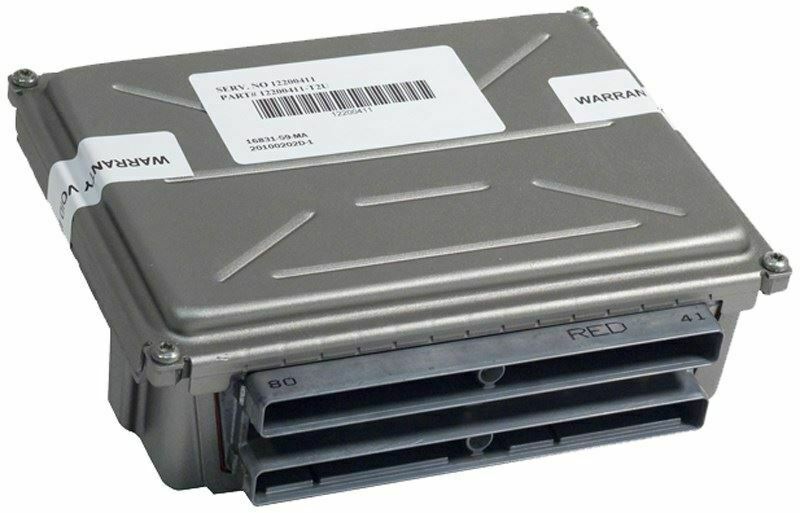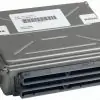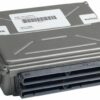Is Your 2004 GM Truck or SUV Running Rough?
If you’re dealing with a persistent check engine light, erratic engine behavior, or a vehicle that simply won’t start, the root cause might be a failing Powertrain Control Module (PCM). As the central computer for your engine and transmission, the PCM is responsible for managing dozens of critical functions every second. When it begins to fail, it can create a cascade of frustrating and difficult-to-diagnose problems. This replacement PCM, part number 12586243, is the definitive solution to restore your vehicle’s performance, reliability, and efficiency.
This isn’t just a generic part off a shelf. We provide a crucial service by programming this module specifically to your vehicle’s Vehicle Identification Number (VIN) before it ships. This ensures that the unit has the correct factory software for your specific engine, transmission, and options package, making installation as seamless as possible. By loading the latest GM-certified updates, we help resolve many common drivability issues and ensure optimal operation.
From the Diagnostic Bay
We had a 2004 GMC Sierra 2500 with the 8.1L come into the shop that was a real head-scratcher. The owner had been chasing a ghost for months, replacing the throttle body, mass airflow sensor, and even a few oxygen sensors based on a slew of intermittent codes. The truck would run fine for a day, then suddenly go into reduced power mode or stall at a stoplight. After checking all the wiring and confirming the new parts were good, we hooked up a scope to the PCM’s 5-volt reference circuit. We found the voltage was fluctuating wildly, causing the sensors to send junk data to the computer. The culprit wasn’t any of the sensors, but the internal voltage regulator in the original PCM. A new, properly programmed module fixed everything instantly. It’s a classic case of a failing computer making good parts look bad.
Diagnosing a Faulty 2004 GM PCM
A failing engine computer can manifest in numerous ways, often mimicking other component failures. If you’re experiencing any of the following symptoms, it’s a strong indication that your 2004 GM PCM may need replacement. Verifying the issue with a professional diagnostic scan is always recommended, but these are the tell-tale signs.
Common Symptoms of PCM Failure
- ✔ Check Engine Light: The light is illuminated with communication-related codes (U-codes) or multiple, seemingly unrelated sensor codes.
- ✔ No-Start or Hard-Start Condition: The engine cranks but refuses to start, or takes an excessively long time to fire up, either hot or cold.
- ✔ Poor Engine Performance: You may notice a significant loss of power, hesitation during acceleration, or rough idling.
- ✔ Reduced Fuel Economy: A failing PCM can’t efficiently manage the air-fuel mixture, leading to a noticeable drop in MPG.
- ✔ Erratic Transmission Shifting: The PCM also controls transmission functions, and a fault can cause harsh shifts, delayed engagement, or getting stuck in one gear.
- ✔ Intermittent Stalling: The vehicle may stall unexpectedly while driving or when coming to a stop.
The Importance of VIN Programming
For modern vehicles, the PCM is not a one-size-fits-all component. The software it contains is tailored to your vehicle’s exact specifications. Without proper VIN programming, a replacement PCM will not be able to communicate correctly with the other modules in your vehicle, such as the Body Control Module (BCM) or anti-theft system (Passlock/VATS). This can result in a no-start condition, incorrect engine operation, or persistent error codes. Our process eliminates this headache. By providing your VIN, you receive a unit that is ready for installation, loaded with the correct software and latest updates from General Motors for your specific 2004 GM PCM application.
Installation and Post-Install Procedures
Physically replacing the PCM is often straightforward. It’s typically located in the engine bay—often on the driver’s side fender, under the battery tray, or next to the air filter box. Always disconnect the negative battery terminal for at least 30 minutes before beginning work to ensure all modules are powered down.
After installing the new module, some vehicles may require a security relearn procedure or a Crankshaft Position System Variation (CASE) relearn. The security relearn can often be done without special tools (cycling the key in the ignition), while the CASE relearn typically requires a capable bi-directional scan tool. These procedures ensure the new PCM is fully synchronized with your vehicle’s anti-theft and engine sensor systems.
Frequently Asked Questions
What is a PCM and what does it do?
The Powertrain Control Module (PCM), often called the Engine Control Module (ECM), is your vehicle’s main computer. It controls all aspects of engine performance, including fuel injection, ignition timing, emissions systems, and automatic transmission shifting to ensure optimal power and efficiency.
Do I need to have this module programmed?
No, we handle the programming for you before shipment. Simply provide your vehicle’s 17-digit VIN when you place your order, and we will flash the module with the latest GM software specific to your vehicle.
Where is the PCM located on my 2004 GM vehicle?
The location varies by model. On trucks like the Silverado and Sierra, it’s often on the driver’s side inner fender, under the battery. On SUVs like the Trailblazer or Envoy, it’s typically next to the air filter box. For vans like the Express or Savana, it’s in the rear of the engine compartment.
Will this fix my check engine light?
If a faulty PCM has been professionally diagnosed as the cause of your check engine light, then yes, this part will resolve the issue. However, if the light is on due to other failing sensors or components, those issues will need to be addressed separately.
What is a security relearn procedure?
This is a process that syncs the new PCM with your vehicle’s anti-theft system. For many 2004 GM vehicles, it involves turning the key to the ‘ON’ position for 10-15 minutes, then off, and repeating this cycle three times. This allows the modules to recognize each other.
Is this part compatible with part number 89017739?
Yes, this PCM with service number 12586243 is a direct replacement and is fully compatible with the interchangeable part number 89017739.


